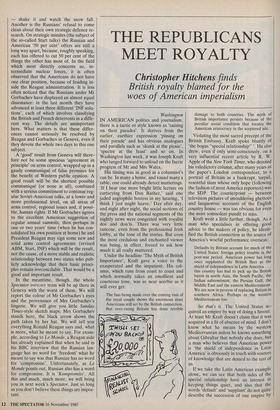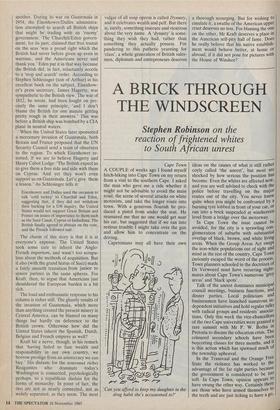THE REPUBLICANS MEET ROYALTY
Christopher Hitchens finds
British royalty blamed for the
woes of American imperialism Washington IN AMERICAN politics and journalism, there is a tactic or style known as 'raining on their parades'. It derives from the earlier, earthier expression 'pissing on their parade' and has obvious analogues and parallels such as 'skunk at the picnic', `spectre at the feast' and so on. In Washington last week, it was Joseph Kraft who lunged forward to unload on the faerie progress of Mr and Mrs Wales.
His timing was as good as a columnist's can be. In many a home, and round many a table, one could already detect mutterings. `If I hear one more bright little lecture on curtseying from Dan Rather,' said one jaded anglophile hostess in my hearing, 'I think I just might heave.' Day after day, and night after night, the social sections of the press and the national segments of the nightly news were congested with royalist dos and don'ts. There was very little rancour, even from the professional Irish lobby, at the tone of the stories. But even the most credulous and enchanted viewer was being, in effect, forced to ask how much it all really mattered.
Under the headline 'The Myth of British Importance', Kraft gave a voice to the exasperated and the impatient. His col- umn, which runs from coast to coast and which normally takes an emollient and courteous tone, was as near acerbic as it will ever get: The fuss being made over the coming visit of the royal couple shows the enormous store Americans still set by the British connection. But over-rating Britain has done terrible
damage to both countries. The myth of British importance persists because of the peculiar social condition that locates the American aristocracy in the sceptered isle.
Violating the most sacred precept of the British Embassy, Kraft spoke bluntly of `the bogus "special relationship" '. He also drew, even if only semi-consciously, on a very influential recent article by R. W. Apple of the New York Times, who devoted his valedictory column, after many years as the paper's London correspondent, to a portrait of Britain as a bankrupt, torpid, resentful slum whose only hope (following the fashion of most America reporters) was the SDP. The counterpoint — between television pictures of smouldering ghettoes and languorous accounts of the English country house — was too obvious for even the most somnolent pundit to miss.
Kraft went a little further, though. As a man who specialises in offering good advice to the makers of policy, he identi- fied the British connection as the source of America's woeful performance overseas: Defaults by Britain account for much of the United States' foreign policy trouble in the post-war period. American power has long since supplanted the British fleet as the shield of independence in Latin America - • this country has had to pick up the British baton in north Asia, the South Pacific, the Indian subcontinent, the Persian Gulf, the Middle East and the eastern Mediterranean. We are now in process of replacing Britain in southern Africa. Perhaps in the western Mediterranean too.
So that's it. The United States ac- quired an empire by way of doing a favour. At least Mr Kraft doesn't claim that it was acquired in a fit of absence of mind. I don't know what he means by the western Mediterranean unless he knows something about Gibraltar that nobody else does, but a man who believes that American power is 'the shield of independence in Latin America' is obviously in touch with sources of knowledge that are denied to the rest of us.
If we take the Latin American example alone, we can see that both sides of the special relationship have an interest in keeping things quiet, and also that the words 'default' and 'supplant' do not quite describe the succession of one empire by
another. During its war on Guatemala in 1954, the Eisenhower/Dulles administra- tion attempted to search all British ships that might be trading with an 'enemy' government. The Churchill/Eden govern- ment, for its part, claimed that free transit on the seas 'was a proud right which the British had never before given up even in wartime, and the Americans never said thank you.' Eden put it in that way because the British did, in fact, reluctantly accede to a 'stop and search' order. According to Stephen Schlesinger (son of Arthur) in his excellent book on the subject, Eisenhow- er's press secretary, James Hagerty, was sympathetic to the British view. The war of 1812, he wrote, had been fought on pre- cisely the same principle, 'and I don't blame the British for one minute getting pretty rough in their answers.' This was before a British ship was bombed by a CIA plane in neutral waters.
When the United States later sponsored a mercenary invasion of Guatemala, both Britain and France proposed that the UN Security Council send a team of observers to the region. To which Eisenhower re- torted, if we are to believe Hagerty and Henry Cabot Lodge: 'The British expect us to give them a free ride and side with them on Cyprus. And yet they won't even support us on Guatemala. Leesi give them a lesson.' As Schlesinger tells it:
Eisenhower and Dulles used the occasion to talk 'cold turkey' to Churchill and Eden, suggesting that if they did not withdraw their backing for a UN inquiry, the United States would not support Great Britain and France on issues of importance to them such as the Suez Canal, Cyprus or Indochina. The British finally agreed to abstain on the vote, and the French followed suit.
The charm of this story is, that it is at everyone's expense. The United States took some care to inherit the Anglo- French imperium, and wasn't too scrupu- lous about the methods of acquisition. But it also (with the grand hiatus of Suez) made a fairly smooth transition from junior to senior partner in the same spheres. For Kraft, then, to argue that Americans just shouldered the European burden is a bit rich.
The loud and enthusiastic response to his column is richer still. The ghastly results of the invasion of Guatemala, which more than anything created the present misery in Central America, can be blamed on many things but hardly on deference to the British crown. Otherwise how did the United States inherit the Spanish, Dutch, Belgian and French empires as well?
Kraft hit a nerve, though, in his remark that 'having failed to fuse wealth and responsibility in our own country, we borrow prestige from an aristocracy we can buy.' His distaste for the nouveaux riches Reaganites who dominate today's Washington is connected, psychologically perhaps, to a republican disdain for the forms of monarchy. In point of fact, the two are not as nearly connected, not as widely separated, as they seem. The most vulgar of all soap operas is called Dynasty, and it celebrates wealth and pelf. But there is, surely, something insecure and vicarious about the very name. A 'dynasty' is some- thing they wish they had, rather than something they actually possess. For pandering to this pathetic yearning for 'class', a whole generation of British sales- men, diplomats and entrepreneurs deserves a thorough scourging. But for wishing to emulate it, a swathe.of the American upper crust deserves no less. For blaming the one on the other, Mr Kraft deserves a place in the American self-pity hall of fame. Does he really believe that his native establish- ment would behave better, at home or abroad, if it did not pose for pictures with the House of Windsor?



































































 Previous page
Previous page